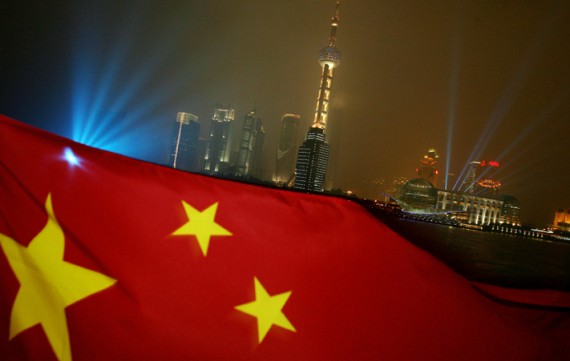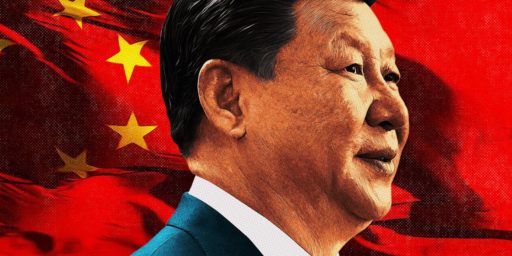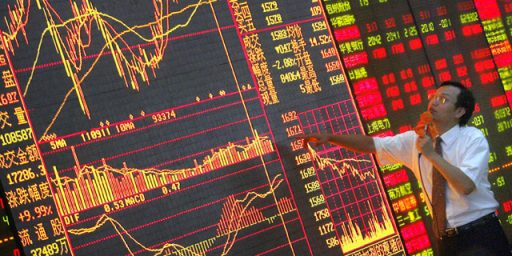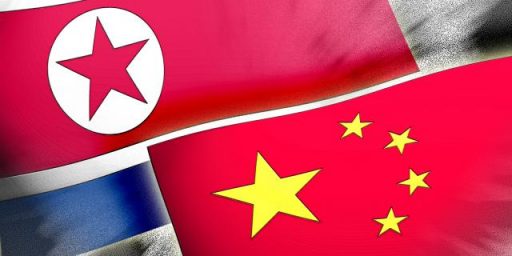China Is Not A Model For America, Or The World
China's government may be more "efficient," but it's hardly a model for the rest of the world.
Dave Schuler’s post today about Eugene Robinson’s apparent desire for “seriousness” among American politicians in the same way that Chinese leaders are supposedly serious is a good starting point for a discussion about an Op-Ed that appeared yesterday in The New York Times by Eric Li, a Shanghi-based venture capitalist. In his piece, Li argues that China’s political model is superior because it eschews concerns about such trivial things as democracy and individual rights:
This week the Obama administration is playing host to Xi Jinping, China’s vice president and heir apparent. The world’s most powerful electoral democracy and its largest one-party state are meeting at a time of political transition for both.
Many have characterized the competition between these two giants as a clash between democracy and authoritarianism. But this is false. America and China view their political systems in fundamentally different ways: whereas America sees democratic government as an end in itself, China sees its current form of government, or any political system for that matter, merely as a means to achieving larger national ends.
In the history of human governance, spanning thousands of years, there have been two major experiments in democracy. The first was Athens, which lasted a century and a half; the second is the modern West. If one defines democracy as one citizen one vote, American democracy is only 92 years old. In practice it is only 47 years old, if one begins counting after the Voting Rights Act of 1965 — far more ephemeral than all but a handful of China’s dynasties.
Why, then, do so many boldly claim they have discovered the ideal political system for all mankind and that its success is forever assured?
The answer lies in the source of the current democratic experiment. It began with the European Enlightenment. Two fundamental ideas were at its core: the individual is rational, and the individual is endowed with inalienable rights. These two beliefs formed the basis of a secular faith in modernity, of which the ultimate political manifestation is democracy.
In its early days, democratic ideas in political governance facilitated the industrial revolution and ushered in a period of unprecedented economic prosperity and military power in the Western world. Yet at the very beginning, some of those who led this drive were aware of the fatal flaw embedded in this experiment and sought to contain it.
The American Federalists made it clear they were establishing a republic, not a democracy, and designed myriad means to constrain the popular will. But as in any religion, faith would prove stronger than rules.
The political franchise expanded, resulting in a greater number of people participating in more and more decisions. As they say in America, “California is the future.” And the future means endless referendums, paralysis and insolvency.
(…)
The West’s current competition with China is therefore not a face-off between democracy and authoritarianism, but rather the clash of two fundamentally different political outlooks. The modern West sees democracy and human rights as the pinnacle of human development. It is a belief premised on an absolute faith.
China is on a different path. Its leaders are prepared to allow greater popular participation in political decisions if and when it is conducive to economic development and favorable to the country’s national interests, as they have done in the past 10 years.
However, China’s leaders would not hesitate to curtail those freedoms if the conditions and the needs of the nation changed.
Li is correct that the West’s commitment to democracy and individual autonomy is relatively new compared to the long history of China, where a vast nation has been held together for thousands of years by force and repression by leaders concerned more with amassing power for “the nation” than bettering the lives of individuals or permitting them to live their lives freely. I’d disagree with his assertion that it’s based on faith that democratic institutions are superior to any other form of government so much as it is based on an ethical judgment about the value of the individual vis a vis the collective, whether that collective is the family, the tribe, the church, or the state.
Certainly there have been many political theorists who have argued that a government based on the idea of representative democracy is superior in the long term to its alternatives but I would argue that the reason that the idea of Western democracy has proven so appealing is not because of it’s efficiency, but because of its basic appeal to an idea that nearly all of us believe deep down inside, the idea that as sovereign, rational individuals we have the right to control our own destiny and the institutions that govern us. How that is done is never a matter that’s set in stone, as the differences between the political systems in the Western world, and indeed the differences among the Constitutions of the 50 states, show us quite well. Additionally, there are differences of opinion among Western nations about the appropriate scope of individual rights (as the differences in how nations in Europe treat free speech issues as opposed to how they are treated in the United States demonstrates). Despite these differences, though, there is basic agreement on the moral value of a human being as something that can’t just be pushed around by the state at will to the point where, when that moral value goes unrecognized, there is usually a sense of moral revulsion in reaction to it.
That’s not so true in Li’s beloved China. Take, for example, what Li has to say about the 1989 Tianamen Square uprising:
The 1980s were a time of expanding popular participation in the country’s politics that helped loosen the ideological shackles of the destructive Cultural Revolution. But it went too far and led to a vast rebellion at Tiananmen Square.
That uprising was decisively put down on June 4, 1989. The Chinese nation paid a heavy price for that violent event, but the alternatives would have been far worse.
The resulting stability ushered in a generation of growth and prosperity that propelled China’s economy to its position as the second largest in the world.
In the minds of those of us in the West who watched the events of May and June 1989 unfold on screen, the party that “went too far” was the Chinese government when it sent in tanks to mow down peaceful demonstrators who were doing nothing more than demanding a greater voice in how their country is run. Just as the ongoing massacres in Syria, it was an action that shocked the conscience of every decent thinking person. But it was business as usual for the Chinese government, for whom the people are mere pawns to be moved around a chess board in the name of the national good. You can see a similar example of this attitude in the massive displacement of farmers and other civilians, as well as the destruction of the environment, that took place when Beijing decided to build the Three Gorges Dam. In a nation where there are no property rights, and where people are mere functionaries of the state, it’s easy to build massive projects like that because you don’t need to worry about little annoyances like liberty. It may be “efficient,” but it is hardly ethical.
Li concludes his article this way:
The fundamental difference between Washington’s view and Beijing’s is whether political rights are considered God-given and therefore absolute or whether they should be seen as privileges to be negotiated based on the needs and conditions of the nation.
The West seems incapable of becoming less democratic even when its survival may depend on such a shift. In this sense, America today is similar to the old Soviet Union, which also viewed its political system as the ultimate end.
History does not bode well for the American way. Indeed, faith-based ideological hubris may soon drive democracy over the cliff.
Li is displaying a large degree of hubris about the supposed superiority of the authoritarian monster that is his nation’s government. As many economic analysts have noted, there are plenty of reasons to believe that the economic boom that China has experienced over the past decade or so is not sustainable and that a day of reckoning is coming sooner rather than later. There is already evidence of this in the real estate glut that seems to to be affecting several parts of the country, as well as the odd phenomenon of Chinese “Ghost Cities.” Li better not count his Chinese chickens before they hatch, because he could wake up someday and find his nation dealing with a severe economic downturn, and a Greek-like social crisis as a result. One wonders how many tanks he’d allow the government to use against the people if that happened.
Winston Churchill once said that democracy was the worst form of government, except for all the others. He was right. Yes it’s true that there are plenty of things that democratic institutions and a respect for individual rights make difficult, and plenty of people have pointed out how easy it has been for the Chinese to build superhighways, new airports, and bullet trains in recent years while we deal with an infrastructure that is clearly in need of being updated. Part of the reason for this, of course, is that it’s much easier to build new roads and rail lines where there was nothing but vacant land before than it is to tear down existing infrastructure and put up something new in its place. The other reason, though, is because our government can’t just do whatever it wants. It’s limited by laws that require it to respect individual rights and to take into account the impact projects will have on surrounding communities rather than just forcibly moving people out of the way like the Chinese did with the Three Gorges Dam. It’s inefficient, it’s more expensive, and it can get frustrating. But, it’s also better than the alternative.
Yes, there’s plenty about our current political structure that needs to be fixed, but even those imperfections are a sign of what makes representative democracy special. Our government isn’t designed to just “get things done” by rolling over minorities and individual rights. Yes, that’s a value choice, but I’d submit it’s the correct one. The state exists for the people, not the people for the state. Someday, the Chinese people will learn this lesson. Strike that. I have a feeling the Chinese people already know this, it’s the Chinese government that will one day learn the lesson that a system that holds as its central value the idea that individuals exist to serve the state cannot and will not last. Efficiency isn’t all it’s cracked up to be, especially when it’s built on the dead bodies of the little people.
Sorry Mr. Li, you’re paean to Confucian cum Marxist-Leninist “efficiency” simply isn’t appealing. I’ll take what we’ve got, warts and all.







Wow, a tycoon rather likes authoritarian government that can trample individual rights. Shocking!
We simply put a lot of value on individual rights, and apparently Mr. Li does not. It will be interesting (perhaps in the Chinese curse sense!) to see if, as China’s economic success continues, its population agrees with him.
Regarding the “47 years” charge… of course he avoids talking about how long our system of government has been developing. If you start with Magna Carta, we’re coming up on 800 years. Not 800 years of “democracy” in the modern sense (representative republic with minority rights/protections), of course. But 800 years of political development generally in favor of expanding the franchise and other rights, during which period of time “the West” has done rather well for itself. Meanwhile, China was busy turning itself into a massive clusterf*ck.
It might be one thing to look at that and say “hey, expecting China to switch to a USA-style system overnight is silly.” I would agree with that.
It’s entirely another to look at their authoritarian government and say “yay, this thing is great!”
Yeah, until that authority is turned against you, or until there is a massively bloody revolution or somesuch. China’s oh-so-successful system has been successful for a couple of decades now. Before that… Cultural Revolution anyone? Hello?
Hallelujah.
Rob,
I had the same thought actually. I was unable to find any information about Li using Google — not surprisingly, “Eric Li” is not an uncommon name in China — but one can safely assume that a “venture capitalist” in Shanghi is part of the privileged class in China. For him, the deprivations of Chinese society probably aren’t a very big deal at all.
Right. Mr. Li certainly doesn’t expect the authority of the state to be turned against him. He expects it to (continue to) serve him. If the little people get in the way, eh, well that’s what the tanks are for…
I know it was just an op-ed, but reading that in the NY Times still chilled me to the bone.
As determined how and by whom? I don’t feel comfortable in prescribing as system that’s appropriate or workable for China. Perhaps their system suits them just fine.
I would, however, point out that China’s present consensus was developed after China’s leaders killed between 6 million and 100 million of its people.
Our system is messy and, at least to outsiders, may appear inconsistent. At their best U. S. policies are an emergent phenomenon of the competing views of the American people. IMO our unserious system is well-suited to our large, diverse country.
That ‘Ghost Cities’ report was completely fascinating.
Like Rob, I found Li’s timline of democracy unconvincing – especially his attempt to define full suffrage in the US downward as much as possible without providing any sort of critical interpretation of what citizenship meant in Athens.
Good article.
@Dave Schuler:
As determined by the people in power, of course, who naturally assume themselves to be best suited to make these determinations. And, of course, it’s worth noting that China’s political system was not necessarily the choice of the majority of the Chinese people, nor does it necessarily exist to benefit them personally.
Look, I totally get Chinese authoritarianism and American freedom, but isn’t this being used as a get out of jail free card? We are a clown circus because China is the only other model, and we don’t want to be them?
This does not seem useful or productive introspection, it is a battle of two superficial views.
Paging Professor Taylor.
He wouldn’t be the first representative of an authoritarian regime to woefully underestimate the United States.
.
From Wikipedia: “A 2011 survey shown that 60% of Chinese millionaires plan to immigrate, mostly to the USA or Canada. The EB-5 Investment Visa allows many powerful Chinese to seek for a USA citizenship, and recent reports show that 75% of applicants to this visa in 2011 were Chinese.”
In 1990 I became friends with a recent Chinese immigrant to the U.S., who had graduated from Beijing University, married an American and came to the U.S. because as she put it there was no future for educated women in that country. A number of female friends from college would eventually follow her. Obviously, the existence of women graduates from one of the best universities in the world means something. But laws requiring 50% membership of women that are met with less than half that amount and equal pay laws that exert little influence in society are signs of something else; a disconnect between government and the governed.
Self-government is not simply elections, its a process where coalitions are formed that empower minorities, and the wishes of the governed facilitate the rule of law.
What’s really scary is there are American leftists out there who share Li’s worldview and that some of them hold elected offices. Reps. McDermott and Moran, for example, only are slightly removed from a Pol Pot way of thinking.
As for democracy vs. autocracy there’s no doubt the former trumps the latter and rightfully so. With one caveat, however: Hamiltonian democracy is the better approach when compared to Jeffersonian democracy. Power to the people is all well and good, but you need to be very, very careful not to cede too much power there. You don’t want Zombieland making too many important decisions, and principles of liberty should not end up being suicide pacts for sovereign nations.
It may not be a very good model for the west but it’s probably quite a good model for China at this stage of it’s development.
@Tsar Nicholas:
What was your previous job? Speechwriter for Sarah Palin?
Joe,
Tell that to the millions of Chinese people who have been murdered and imprisoned in the name of this “efficient” system.
It’s also not that efficient in the long run if you keep having revolutions. The idea behind voting and democracy is the ability to have a way of getting rid of the authorities without needing a lot of blood and messiness.
And I’m sort of surprised at Mr. Li’s lack of knowledge of history. Wasn’t one of the seeds of revolution the Withdrawal of the Mandate of Heaven (i.e, floods, famines, etc.) when it came to overturning dynasties?
@Doug Mataconis:
Do you have any support for this claim that millions of Chinese have been murdered and imprisoned since Deng opened up their economy in the 80’s?
@Doug Mataconis
It’s unfortunate so many on the left in our country have rejected the anti-authoritarian roots of their ideals and embraced paternalism. Conservatives aren’t the only ones who have degenerated. A liberal by definition should find the Chinese government repugnant.
@Ben Wolf:
Only if he has no knowledge of historical fact or context. More or less repugnant than what? The regime of Mao? Of the Kuomintang? Of the Japanese occupation and warlords? Of the crumbling imperial dynasty? Is China Sweden? No, but in terms of relative freedom, security, and material well being the Chinese are better off today than they’ve been for probably 200 years. It’s easy for American pharisees sitting at their computers to give lectures to other societies but unfortunately the reality is rather more complex than their simplistic pieties.
The preceding comments demonstrate that whatever his other errors, Eric Li was correct in characterizing modern American democracy as based on absolute faith. It is rather telling that the comments here disparage the Chinese system based on subjective revulsion to unfamiliar features rather than an objective analysis. One can imagine Soviets similarly critiquing capitalism as heartless or predatory, but that didn’t get them far.
In my view, when comparing two or more systems, the first thing to do is to draw up objective parameters to evaluate them on. The primary parameter in this context as far as I’m concerned is the long sustainability of the system. The hippie communes, for instance, sound instinctively appealing but proved utterly unworkable.
I haven’t made up my mind about the overall sustainability of democracy vs. authoritarianism but it should give defenders of democracy pause for thought when China can get huge infrastructure projects done under budget and under time while democracies seem to spend more time and money on lawsuits and lobbyists than actual construction.
It is also striking that given the belief that democracy is utterly and everywhere always superior, it has historically been so scarce, temporally and geographically.
True defenders should take a cold hard look at the guts of their system, ruthlessly identify shortcoming and rectify them immediately rather than crouch in ideological bunkers preaching to the choir how their system is the pinnacle of human achievement.
Actually what is really scary is that anyone would believe most of the horse$hit that you post here…if you actually believe what you write, well, that would make you even more delusional than Li is…
Obviously certain Shanghai-based venture capitalists share that trait with certain American pharisees…
@Tsar Nicholas: I grew up in Seattle and know Jim Mc Dermott. He and I disagree on many issues. He is a liberal and a leftist. I don’t believe that he was a good representative–although I must agree that he was a good match to his constituency. I know him to have been an effective professor and a competent therapist. He is a good man. He is not anything like Pol Pot at all! I take offense at your comparison.
You sir, have no character whatsoever. Cal Thomas was able to recognize a mistake when he saw it; can you?
@An Interested Party:
Indeed they do, there’s never any shortage of people willing to tell other societies how to conduct themselves but I don’t think Li said American government was deeply repugnant. I’m certainly not holding up the Chinese as a model of democratic governance but merely suggesting that the hyperbole (eg.Doug’s suggestion that the current Chinese govt has murdered millions) and trite banalities ignore history and context.
Trying to compare the Chinese and US systems of govt is completely fatuous given the Chinese experience. Over the last 100 years or so China has seen it’s attempted dismemberment by the imperial powers, rule by corrupt and murderous regimes of left and right, revolutions, brutal occupations and declared and undeclared war with the US. Until 1971 when Deng (who btw is one of the greatest men of the 20th century) shifted the country to neo liberal economic policies and fully opened it to the west China was a poor and relatively backward country that was either going lurch back into anarchy and instability or enter the first world. Since then it’s become the second largest economy in the world and it’s people have a achieved a measure of economic and social (but not political freedom) that would have been unimaginable 40 years ago. It hasn’t been painless but then was the American industrial revolution painless? Where it goes from here is hard to say but ultimately I find it hard to believe a communist political structure can last indefinitely. The odds are that in order to preserve stability a measure of political freedom will have to be granted and at some point achieve critical mass.
@Brummagem Joe:
Oops literal…1979
It certainly is ironic that he did so much to raise the standard of living for millions of people while his predecessor was, arguably, the greatest mass murderer in history…
@An Interested Party:
Arguably, but probably not. His detractors always include famine deaths which in his case unlike Stalin’s were much more likely the consequences of incompetence and the limitations of the system. Several million people died in famines in India during WW 2…was Churchill a mass murderer? I’m not writing Mao a job recommendation but one has to sort the real from the demonisation. He was certainly a rather nasty dictator who killed a lot of people but then so was Chiang. And on the other hand he is the principal creator of the modern state of China. Dictators successful and unsuccessful (Ataturk, Franco, Napoleon, Salazar) tend to leave a lot of bodies lying around.
While I personally loathe the Chinese system, I wouldn’t be over confident about the success of the American system among developing countries in the future. A leader of a third world country looking to rapidly industrialize can easily compare the two systems and see which one appears to be doing better over the past few decades. It doesn’t seem that the Chinese style of corruption and authoritarianism has put it at a disadvantage to the American style of corruption and political dysfunction.
@Maxwell James: If reading these sentiments from a member of the Chinese oligarchy chilled you, what about reading columnist Thomas Friedman, influential American liberal Jew, writing much the same thing in those same pages?
I find it fascinating comparing Japan and China. China is on the surface a very authoritarian system with control down all the way to the local cadres. In reality there seems to be a high-level organization which quickly trickles down into a free-for-all at the local level, with the local big-wigs doing whatever they can get away with, held in check only by their fear of possible peasant revolt (not high) and getting whacked down by higher authorities (not likely unless there’s a big stink.) Which is why the Chinese government is so wary of mass movements and anything that might cause any disorganized discontent to coalesce. The moral of the story is that China can pass laws until they’re blue in the face, but getting them implemented is a whole ‘nother cauldron of piscian species.
By contrast, Japan is a very structured, very top-down society after the regulation get figured out. It takes a hell of a long time to get regulations and laws passed, but the distribution mechanism is highly efficient, and everyone adheres to it.
@grumpy realist:
But Japan has been a first world country for over 100 years. It defeated Russia in a major war 108 years ago sending their prinicipal modern fleet to the bottom. I wouldn’t disagree too much with your characterisation of how China works, in many practical ways it doesn’t look too much different from the US in the last quarter of the 19th century with a pseudo communist oligarchy standing in for a financial/industrial oligarchy.